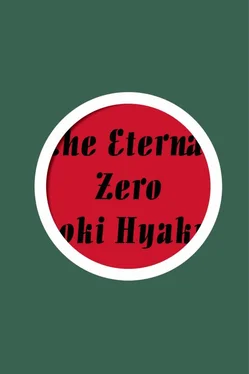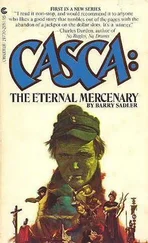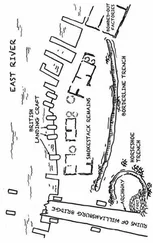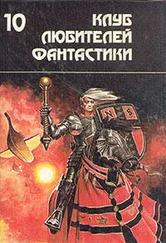He and the reserve officer argued back and forth for a while until the younger man folded, and they switched planes. I remember that scene very well. Their conversation was bizarre enough as it was, but what happened afterwards cemented the events of that day in my memory.
They took off before dawn. Ensign Miyabe didn’t return.
___
Onishi fell silent, a terrible look on his face. After a long silence he said, “There’s an unpleasant continuation of this story.”
“What is it, sir?”
Onishi seemed hesitant.
“Whatever it is, please tell us.”
In response to my prodding, he seemed to make up his mind and opened his mouth. “Six Zeros carrying bombs sortied that day. But one of them was forced to make an emergency landing on Kikaijima Island due to engine problems.”
I felt something cold race down my spine. “Is… Was it…”
“Yes. It was the Zero that Ensign Miyabe should have flown: the Model 52. The pilot was the man who had switched places with Miyabe-san.”
I was rendered speechless.
“Had Ensign Miyabe not asked to change planes, he might have been the one to survive.”
“No, no!” Keiko nearly screamed.
“It must have been fate. The goddess of fortune had abandoned him at the last moment.”
“That’s horrible!” Keiko yelled.
I was dumbfounded.
Had my grandfather been overcome with nostalgia at the sight of an old Model 21 on his final mission and thought to pilot it to his death? Had my grandfather, who had fought at Pearl Harbor and Guadalcanal in the Model 21, wanted to go down with an old war buddy? If there hadn’t been a Model 21 there that day, would he have sortied in the Model 52 and survived?
Was the Model 21 a god of death that led him to the afterworld? Can such a terrifying twist of fate really happen?
No, it couldn’t be. It wasn’t possible. It seemed all too arbitrary.
That instant, I felt a jolt race through me. “Onishi-san, what was the name of that pilot?” I asked breathlessly.
Onishi seemed briefly lost as to what I was talking about. “Do you mean the name of the pilot that made the emergency landing?”
He put on his glasses and flipped through the pages of the notebook.
“Ah, here it is,” he said, pointing.
On the page was a list of the special attack pilots who had died in combat, sorted by date, from August of 1945. I peered at the notebook. Next to five names was another, with the annotation: “Crash-landed on Kikaijima.”
“Here.” Onishi seemed to be having trouble making it out. His reading glasses must have been out of date.
“May I see?”
Onishi nodded and handed over the notebook. I practically snatched it out of his hands. There, in neat script, were the words:
“Ensign Kenichiro Oishi, Age 23, Student Reservist 13th Class, Waseda University”
“Ahh,” I groaned.
“What’s wrong?” Keiko asked fearfully. She looked down at the notebook. “Ah!” she cried.
I tried to say something to her, but my voice refused to work. My teeth clacked together.
Finally, I eked out, “Kenichiro Oishi… our Grandpa!”
Grandpa leaned back into the chair in his study and closed his eyes.
After a while he opened them and said, “I knew I’d have to tell you everything at some point.”
I nodded, speechless. Keiko was sitting next to me.
“When I heard that you were doing research on Miyabe-san, I prepared myself, knowing this day would come.” He retrieved a pill from his bottle of heart medication and washed it down with a sip of water.
“Matsuno had insisted that there was no need to tell the children, but I still planned on talking to you about it someday. Just in case the opportunity to tell you never arose, I wrote it all down in a letter for you to read. I left it in the care of a junior lawyer some ten years ago. If I suddenly passed away, he was to give it to Kiyoko.”
___
I met Miyabe-san at the Tsukuba Air Unit.
We received training there to become kamikaze pilots. Not that we had been told as much from the outset. At first, we were trained in the basics of flight technique. Miyabe-san was our instructor for those sessions.
After completing the flight-training course, we students were handed a form on which we were to respond whether we would volunteer or not for the kamikaze units. I selected to volunteer, but in fact I did not wish to do so. I doubt anyone actually wanted to. Yet everyone replied that they would. Were we gutless? I don’t think that’s correct.
Back then, whether on the continent or on the islands dotted around the Pacific, many troops were giving up their lives every day. The newspapers carried rousing proclamations from Imperial General HQ, but also the phrase “shattered jewels.” Given all that, I was willing to surrender my life if doing so would protect my homeland and loved ones. Even if that meant dying a kamikaze.
Yet there was also a resistance to dying. We weren’t madmen. We weren’t suicide-bound lemmings, joining the hoard, racing off a cliff into the ocean below. We wanted our deaths to have some meaning.
___
Miyabe-san was gentle in both manner and speech. Despite the countless scenes of carnage he had survived, his quiet demeanor set him apart from the other instructors.
What I sensed more than anything from him, however, was his internal conflict about teaching us how to fly. To repeat, we were to be kamikaze pilots. I felt that it pained him to teach us flight techniques. He would praise us when we made progress, but there was always sadness in his smile.
Miyabe-san was a very compassionate man.
Once, during a training session, there was an accident in which one of our classmates died. While we were still mourning the loss, a certain officer hurled abuse at him and us. Miyabe-san stuck out his neck and defended the honor of the fallen reserve officer.
All of us were ready to give up our lives for him after that.
Had Miyabe-san not spoken up then, his destiny as well as mine might have been different. A person’s fate can be drastically altered by the most trivial things. I still find myself confounded by the mysteries of fate.
This happened one month later. We were in the middle of a training flight when enemy aircraft suddenly appeared. Miyabe-san, engrossed in instructing us, didn’t notice their approach. Even veteran pilots like him occasionally made such errors.
I spotted the American fighters. I had just completed a dive and was returning to a higher altitude. As if in a trance, without thinking whatsoever, I charged in between the incoming aircraft and the instructor’s plane. I have no idea what I was thinking. I had totally lost myself to the moment. I could make myself look good by saying I went in there with the intention of sacrificing myself for him, but I don’t really know if that’s the truth. But I knew for sure that I wasn’t going to let them lay a finger on Instructor Miyabe.
The trainer planes used by us students were not outfitted with machine guns. Even so, I dashed out in front of the enemy aircraft. Their bullets struck my plane, shattering my windshield. I lost consciousness and began falling, but came to when I was nearing the ground and somehow managed to pull up and fly level. I looked skywards to see an enemy plane plummeting down.
I don’t remember very well what happened next. After touching down, I passed out cold.
I was hospitalized at a naval hospital. Miyabe-san came to visit me once. He gave me an overcoat. He had apparently taken note of the fact that mine had grown threadbare and tattered. His overcoat was government-issued, too, of course, but he’d had some work done on it. It had a cotton lining, and leather affixed to the collar.
Читать дальше

![Nick Cracknell - The Quiet Apocalypse [= Island Zero]](/books/28041/nick-cracknell-the-quiet-apocalypse-island-zero-thumb.webp)










